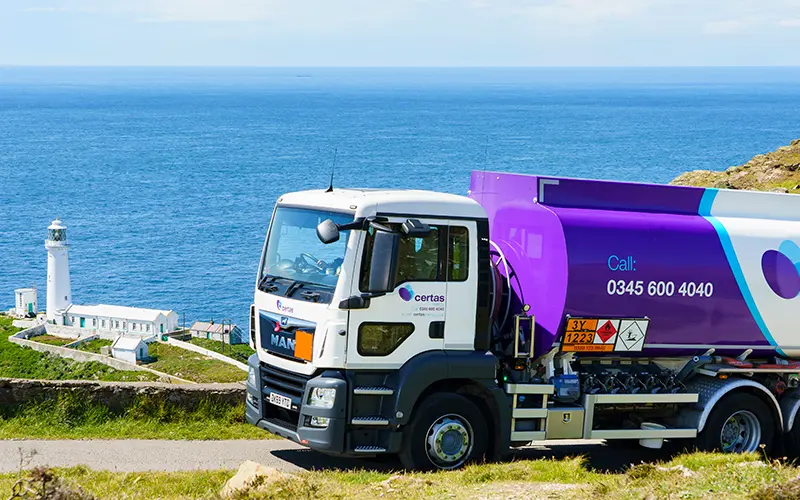The case for farm fuel security has never been stronger. According to the rural insurer NFU Mutual, reports of diesel thefts more than doubled in 2022, fuelled by the cost of living crisis and rising pump prices.
The latest NFU Mutual claims figures show the cost of diesel theft rose to a record £886,197 in the year, prompting the insurer to urge farmers to ‘fortify their farmyards’ and minimise the risk of theft.
But it’s not just the loss of vital fuel that farmers need to be concerned with. NFU Mutual warned that thieves often damage tanks during a raid, leaving fuel running into the ground where it can cause pollution, as well as an increased fire risk.
It is therefore pivotal for farmers to give the right care and attention to tanks and keep fuel security and safety high on their agenda to prevent theft but protect the environment.
Ciaran Farrelly, general manager at Certas Energy, offers his top tips on tanks, telemetry and everything in between to help you choose the right storage solutions for your farm.
Putting health and safety first
If you’re looking to boost the security of your fuel, a fuel storage tank is likely the first thing that comes to mind. Not only can tanks protect this valuable commodity from the likes of opportunistic thieves, but it can also help protect your farms from any spills, leaks or groundwater contamination, which can result in heavy fines and even prosecution if environmental damage is caused.
With so much to consider, it can be difficult to know where to turn or how to make the safe choice. Here are some of the legal obligations you need to consider when purchasing a new tank:
- Your fuel must be secured in a storage solution that’s been designed to meet ISO 9000 quality management standards.
- The tank you choose must be bunded or surrounded by a secondary containment structure.
- The bund must have a life-expectancy of at least 20 years with maintenance; be impermeable to oil and water (walls and base), with no drain-down pipe; contain every part of the tank, with taps and valves directed down and locked shut when not in use; and contain delivery pipes that are permanently attached to the primary tank. These must be fitted with self-closing taps or valves and locked inside when not in use.
- All components of your tank must be at least 10 metres away from inland or coastal waters, and this includes yard drains, dry ditches and land drains. This will help ensure in the event of a spillage, waterways will not be polluted, or public health put at risk. If tanks are underground, they must also follow the Defra Groundwater Protection Code.
As an added value service, we also provide on-site safety farm surveys by OFTEC-registered engineers, who can provide bespoke advice and recommendations. Furthermore, as part of our Safety F1rst initiative, we work with the farming community to provide training on safe storage of fuel, best practice in preventing spills and leaks, and what to do in the event of an incident.
Need to find a tank that fits with your farm business requirements? Click here to learn more.
Did you know
If you are happy with your tank and are not looking to purchase a new one, it is advisable to take the time now to check your tanks for cracks and leaks. Contact the Environment Agency immediately if you have any concerns.
Keep an eye on your fuel with telemetry
Did you know that tank monitoring solutions are a smart and convenient solution that can help you keep an eye on fuel levels? With these systems, you can check for unusual activity, as well as optimise stock management and mitigate the chance of an environmental incident.
At Certas Energy, we’re dedicated to helping you keep your fuel stores safe and secure. Our wirelessly fitted telemetry system enables real-time remote fuel monitoring across multiple tanks. Automatic alerts are triggered in the event of a sudden drop in levels, which could indicate theft or a leak. This allows you to take swift remedial action, contacting the relevant authorities, such as the police or the Environment Agency, potentially limiting environmental damage and increasing the chances of recouping losses.
This also helps to avoid unexpected downtime from depleted stores, as automatic top-ups can be triggered when levels are low. As an additional safety feature, telemetry systems help to reduce the need for manual checks on fuel levels, limiting the need for you or your farm workers to work at a height and reducing the chance of workplace accidents.
If you want to further bolster your tank security, consider installing bright, movement-triggered flood lights, adequate security signage and visible CCTV, robust fencing, and locked cages. Additional features, such as a secure lock or key fob, can also help act as deterrents.
Keen to see telemetry in action? Find out how telemetry helped one busy farm get to grips with fuel monitoring.
Protect other hot targets
It’s not just diesel that’s at risk of being stolen. During the colder months, heating oil becomes a top target for thieves as it is often stored in remote locations and is highly valuable. Simple measures such tank monitoring systems, oil cages and disguising tanks can help protect oil on your farm. Heating oil tanks should be given the same care and consideration as commercial fuel tanks. It’s important to check your tank regularly, especially in advance of any heating oil deliveries. If your tank is over 10 years old, it’s even more important to check for any signs of damage, or for risks of leaks and spillages.
Did you know
Certas Energy supplies Therma35 – a high-quality, cost-effective and compliant heating solution that can be used in farming applications, such as drying and heating? Our industrial heating oil is also winter-grade and has a long shelf life. Plus, with a zero bio content, you can stock up in advance before a cold snap hits, without worrying about spoilage due to microbial content, interruption or waxing.
Want tips on keeping your heating oil tanks – for your home and farm – secure? Check out our handy guide on to avoiding heating oil theft.
Deter thieves with Diesel Defender
Due to the recent red diesel duty changes, some farmers now have to use both non-rebated fuel and rebated fuel to stay compliant. White diesel or non-rebated diesel alternatives do not have the same tell-tale red dye of red diesel, which has made them more vulnerable to theft as it is harder to detect as stolen – but there are ways to protect your white diesel stores, too.
Diesel Defender anti-theft marker dye is a valuable tool for warding off would-be thieves. The liquid blue dye colours white diesel to produce a green fuel, making it distinguishable from white diesel for personal use. It acts as a powerful deterrent to thieves, improving traceability, impacting resale value, and exposing non-commercial use.
Tank stickers can be supplied on request to help advertise that the fuel has been dyed to prevent theft.
Need a recap on red diesel reform rules? Check out our blog to learn the top six things farmers need to know about the legislative changes.
Keep stored fuel in tip top shape
Quality of fuel is also a consideration for farmers – and keeping stored fuel in tip top condition can help reduce the risk of fuel contamination, avoid expensive replacements and minimise unnecessary downtime.
Increased levels of renewable content in red diesel under the Renewable Transport Fuel Obligation (RTFO) has led to reports of farmers experiencing filter blockages and contamination issues with their fuel storage tanks.
Additives are one solution that can help stabilise fuel stored in tanks during the colder months and avoid the effects of increased FAME content.
Take Gas Oil Conditioner, for example. It contains stability additives and a biocide at a ‘protect’ level to keep fuel fresh, increasing fuel shelf life and inhibiting fuel tank sludge formation. Fuel Store Plus is also an option. Stocks that have been stored without treatment for long periods will age – forming solids, darkening in colour and ultimately losing oxidation. This degradation is further accelerated where fuel contains higher levels of FAME. Fuel Store Plus acts to delay the symptoms of fuel ageing – which is irreversible – and has anticorrosion and biocidal properties.
Think tanks. Think Certas Energy.
Certas Energy is committed to providing full fuel management solutions to support safer, smarter fuel storage on farms across the UK. All tanks supplied by Certas Energy meet UK regulations, giving you full peace of mind that your fuel is stored safely, securely and in compliance with the latest guidelines. Whatever your requirements, our full range of tanks and tank-related solutions and services are bound to meet your storage and dispensing needs.
To discuss your tank requirements, speak to our team of experts by emailing [email protected] or call us today on 0345 600 4040.
TAKE CONTROL OF YOUR FLEETS FUEL
Ready to start fuelling your business' success?
Steamline your fleet operations, control costs, and experience the benefits of Certas Energy Fuel Cards. Get in touch to start saving today.




